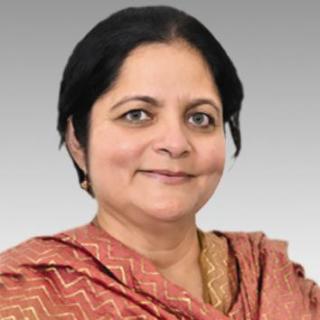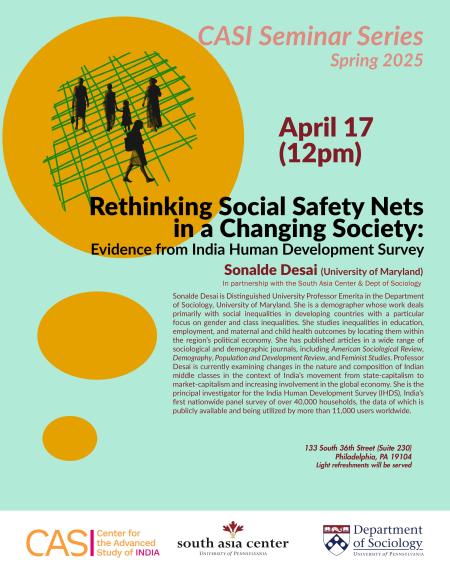Rethinking Social Safety Nets in a Changing Society: Evidence from India Human Development Survey
Ronald O. Perelman Center for Political Science & Economics
133 South 36th Street, Suite 230
Philadelphia PA 19104-6215
About the Seminar:
With a growing economy and declining poverty, India faces a curious challenge in providing a social safety net to its citizens. Using data from three rounds of the India Human Development Survey (IHDS), collected in 2004-05, 2011-12, and 2022-24, this seminar shows that households face considerable transition in and out of poverty as the economy grows. Historically, India’s approach to social safety nets has involved identifying the poor and providing them with priority access to various social protection programs that include both in-kind and cash assistance—however, the nature of poverty changes with economic growth. This churn in households’ economic circumstances makes it difficult to identify and target the poor precisely.
Using unique, newly collected panel data, Professor Desai makes three observations about India’s anti-poverty programs: (1) Identification of households as poor (now dubbed priority households) relies on identification exercises carried out every 10-15 years and assumes that poverty status is relatively static. However, results presented in this seminar will document a substantial transition in and out of poverty. (2) This ex-ante identification of needy households leads to relatively weak correlation between households’ actual economic status and access to social safety nets. This should not be assumed to be an example of elite capture but rather an artefact of a static program design. (3) Social safety nets may need to be redesigned in a way that is responsive to changing economic conditions and unexpected events, both at an individual and at a community level.
About the Speaker: Sonalde Desai is Distinguished University Professor Emerita in the Department of Sociology, University of Maryland. She is a demographer whose work deals primarily with social inequalities in developing countries with a particular focus on gender and class inequalities. She studies inequalities in education, employment, and maternal and child health outcomes by locating them within the region’s political economy. She has published articles in a wide range of sociological and demographic journals, including American Sociological Review, Demography, Population and Development Review, and Feminist Studies. Professor Desai is currently examining changes in the nature and composition of Indian middle classes in the context of India’s movement from state-capitalism to market-capitalism and increasing involvement in the global economy. She is the principal investigator for the India Human Development Survey (IHDS), India’s first nationwide panel survey of over 40,000 households, the data of which is publicly available and being utilized by more than 11,000 users worldwide.
Sonalde Desai is Distinguished University Professor Emerita in the Department of Sociology, University of Maryland. She is a demographer whose work deals primarily with social inequalities in developing countries with a particular focus on gender and class inequalities. She studies inequalities in education, employment, and maternal and child health outcomes by locating them within the region’s political economy. She has published articles in a wide range of sociological and demographic journals, including American Sociological Review, Demography, Population and Development Review, and Feminist Studies. Professor Desai is currently examining changes in the nature and composition of Indian middle classes in the context of India’s movement from state-capitalism to market-capitalism and increasing involvement in the global economy. She is the principal investigator for the India Human Development Survey (IHDS), India’s first nationwide panel survey of over 40,000 households, the data of which is publicly available and being utilized by more than 11,000 users worldwide.

